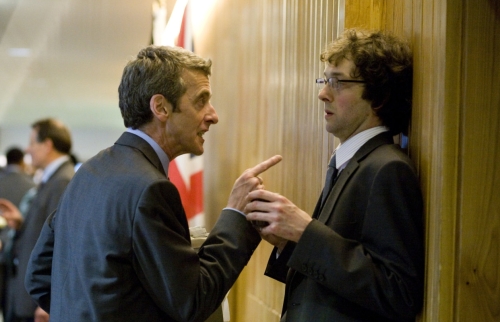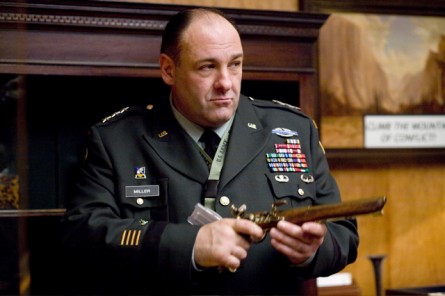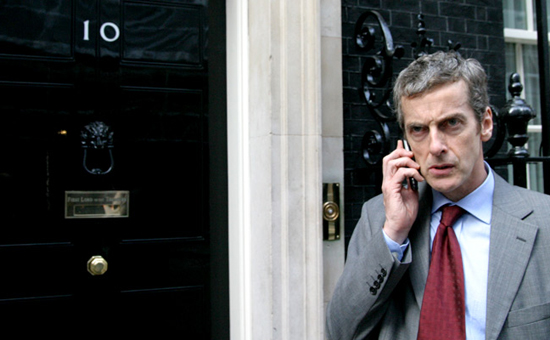The recent Jacqui Smith porn-gate was further proof, if any were needed, that spin rules politics — that politics has become the practice of strategically using the media, through gossip, over-hyped scandals and forced press conferences, to make your party look good and the opposition look bad. It is silly that so much time has been wasted on her husband and so little over the much larger second home expenditure she is also guilty of. But the real crime is that we are more concerned with budgetary transgressions than actual political policy.
Nobody talks about policy anymore unless that policy is a waste of taxpayer dollars. Nobody debates issues or ideology anymore, except when a public figure’s private actions contradict their so called position — hypocrisy, with its reductive logic, is the bluntest weapon in the spin arsenal. Things are so far gone that spin is no longer a tool for slipping policy through; policy is tool to back up spin.
If our current age of politics is defined by spin, then Armando Iannucci, with his BBC satire The Thick of It and its spin-off feature In the Loop (out this week), is the chronicler of this phenomenon. In the show and the film, Alistair Campbell proxy Malcolm Tucker (Peter Capaldi) browbeats hapless ministers into toeing the party line. Major policy decisions and ministers’ careers are recklessly played like pawns in a complex game of PR chess. The brilliant part of Iannucci’s world is that actual politics is completely absent from The Thick of It; the characters spend all their time operating on the level of appearances.
In the Loop takes the same winning formula to the big screen and the same cast of petty misanthropes to the world stage — focussing on the lead up to what may or may not be the Iraq war. The plight of the Brits across the pond is the focus of the film. Talking about the film recently, Iannucci explained that, in his view, the difference between American and British politics is that the British have no real influence and that they must make up for this by talking actively about minute issues. "They must be very specific with their claims to seem like they are making a difference." Americans, on the other hand, have real power and to preserve it they must be as vague as possible. This is what allows nebulous phrases like "Yes we can" to become gospel. "Politicians need to touch the public" as he puts it.

What follows is a hilarious mismatch comedy in which these two diseased political systems attempt to communicate with each other in a joint effort to spin a war. Although, in another stroke of genius, it is never mentioned with whom we’re at war. This further draws attention to the fact that the war itself and the lives at stake are collateral damage in struggle for prestige and public opinion.
Tom Hollander plays Simon Foster, the dim-witted minister whose vapid statements are twisted into the baffling pro-war mantra: "Climb the mountain of conflict." When asked about the research process, Hollander confessed that the fact his character didn’t know anything gave him "carte blanche to not do much research". David Rasche plays Linton, a hawkish Washington warmonger who uses a live grenade as a paperweight. James Gandolfini plays a Colin Powell-esque general who opposes him as much for personal reasons as principles.
A report by a plucky young aide threatens to blow the whole thing when it turns out (surprise) that there are far more cons to war than pros. As with The Thick of It, In the Loop becomes a race against time for Malcolm to prevent the leak and keep up appearances. The standout scenes are the Scot’s dealings with his various Washington counterparts including a confrontation with a barely-pubescent recent graduate, who apparently outranks him. Iannucci was quick to point out that this is no exaggeration. He gave one example of a young ivy league aide who produced a report on US economic involvement in South America only to find himself "in charge" of US economic involvement in South America, becuase everyone else was too busy! The most rewarding exchange is between Malcolm and Gandolfini — "Don’t you ever call me fucking English again!" It is fascinating to see the watchdog of No. 10 Downing St. exasperated, out of his depth and, for once, subordinate to others.
While In the Loop makes it clear that both countries are ruled by party politics, the Americans are a group of individuals driven by personal ideology and greed, whereas British ministers take their orders from the faceless party top-brass. The Brits are clearly out of their depth, trying to play ball on the same grand scale as the Americans. Foster’s lofty concerns of war and peace, for example are temporarily sidelined as he is forced to appease a member of his constituency (Steve Coogan in a killer cameo as a local man complaining about an "unstable" stone wall which might collapse on his mum).
This mode of storytelling puts a human face on the people who run the world. We all assume politicians are selfish and corrupt but this portrays them as just inept and powerless. They are instead practitioners of a system which they have no control over. Iannucci says he liked the idea of people "who took the job to do the right thing being forced to do the wrong thing".

Like a funny version of The Wire, In the Loop is a study in bureaucracy which shows the impotent middle management struggling against clueless superiors and synchophanic grunts. A minor scene shows scheming intern Chad (Zach Woods) carrying around a squash racket ‘just in case’ — but apparently this is a common occurance. In his dealings with actual politicians — some of the show’s biggest fans — Iannucci was often told that the reality of political life was "much, much worse."
Satire this sharp and sophisticated can be just as powerful a device as the hyper-realism of something like The Wire to change people’s minds. But I can’t help but feel, watching both The Thick of It and In the Loop, that the one blind-spot in Iannucci’s all-seeing eye is the media. While reporter characters show up in The Thick of It, the collective ‘media’ is largely a unknown quantity — a vengeful and reactionary god that the politicians must pray to and appease and influence in order to survive. The media’s processes and decisions are hidden from view — as they were up until the very last season of The Wire, when they become a focus. Media is not part of the remit of In the Loop but maybe it should be. As good soldiers like Charlie Brooker and Jon Stewart are keen to point out — the media is broken and it is the impoverishment of good journalism that allows spin to become news.
While on one hand the recent scandals such as the Tory-slander-gate make this a timely film, one can’t help but feel that Iannucci’s target — Blair-era politics and Bush-era warmongering — are already on the decline. In the Loop deals a final blow to a style of politics which has already been fatally wounded in the public’s eyes. If the series and film both reveal that politicians are fundamentally powerless then perhaps we need a new type of satire to unmask the real seats of power, whoever they may be today (the media? bankers? lobbyists?). Likely we’ll just have to wait for an effective summing up of our current troubled times. But even if Iannucci’s subject matter is a bit of a straw man, it is an absolute pleasure to watch him burn.



